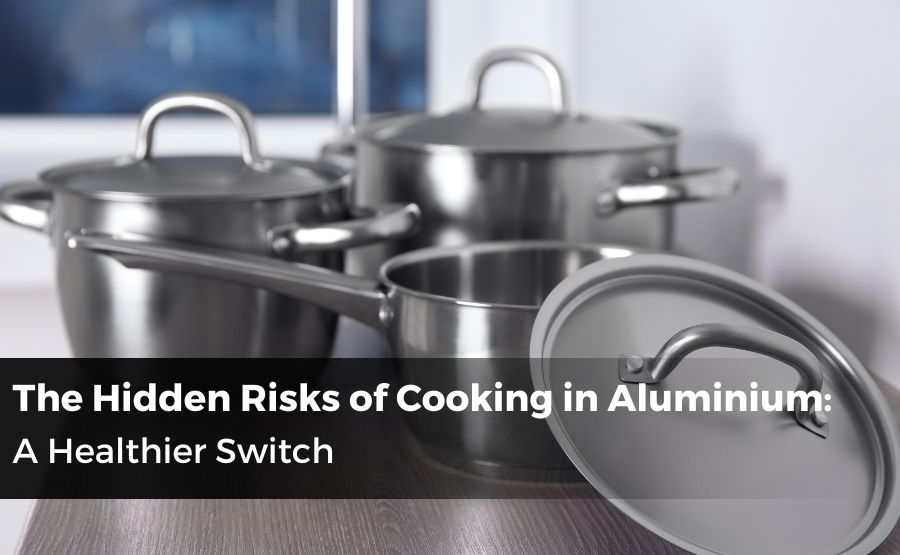The Hidden Risks of Cooking in Aluminium: A Healthier Switch

In many Indian kitchens, aluminium utensils have been a common sight for decades. Lightweight, affordable, and quick to heat, aluminium cookware seems like a convenient option. But is it the healthiest choice for your family?
Recent studies and health experts have raised serious concerns about the long-term use of aluminium for cooking. Let’s uncover these risks and understand why switching to stainless steel could be one of the best decisions for your health and your kitchen.
1. Aluminium Leaching: A Silent Health Hazard
When aluminium cookware is exposed to heat, acidic ingredients (like tomatoes or lemon juice), or even daily wear and tear, it can leach into your food. Over time, the intake of this metal may lead to accumulation in the body.
According to health experts, excessive aluminium consumption is linked to:
-
Neurological issues (like memory problems and Alzheimer’s)
-
Digestive discomfort
-
Potential kidney stress
Even though the amount leached may seem small, daily exposure adds up, especially in Indian households where cooking is frequent and diverse.
2. Non-Coated Aluminium = Greater Risk
Most affordable aluminium cookware is uncoated or poorly anodized, which makes it more reactive to food. This is especially dangerous when:
-
Cooking spicy or acidic curries
-
Using metal spoons or scrubbers
-
Overheating empty pans
Unlike stainless steel, aluminium doesn’t have a stable surface. It corrodes easily, and once the surface gets scratched, the chances of leaching increase significantly.
3. Why Stainless Steel is a Safer Choice
If you’re looking for cookware that is safe, long-lasting, and ideal for Indian cooking styles, stainless steel is the smarter switch. It’s non-reactive, doesn’t leach harmful metals into your food, and can handle high temperatures without warping or releasing toxins.
Key Benefits of Stainless Steel Cookware:
-
Non-toxic and non-reactive
-
Durable and scratch-resistant
-
Even heat distribution (especially with triply stainless steel)
-
Compatible with gas, induction, and electric cooktops
Explore Vinod Stainless Steel Cookware, thoughtfully designed for everyday Indian kitchens.
4. What Makes Triply Stainless Steel Even Better?
Vinod’s Triply Stainless Steel range offers an advanced cooking experience. Triply means it has:
-
A stainless steel inner surface (safe for food contact)
-
An aluminium core (for quick and even heating)
-
A stainless steel outer layer (durable and induction-friendly)
This smart 3-layer construction eliminates the risks of cooking with raw aluminium while keeping the fast-heating benefits intact.
Try the best-seller: Vinod Doniv Solitaire Kadai with Glass Lid, Ideal for daily cooking, curries, frying, and more.
5. Safer Cooking is a Conscious Choice
Switching from aluminium to stainless steel is not just about modernizing your kitchen, it’s about taking charge of your family’s long-term health.
Here’s how you can make the switch:
-
Gradually replace old aluminium pots and pans with stainless steel alternatives
-
Prioritize commonly used items like kadais, saucepans, and tawas
-
Look for quality assurance and food-safe certifications when purchasing
Vinod Steel cookware is trusted by Indian households for over 50 years and offers products that are BIS-certified, nickel-free, and designed for everyday Indian cooking.
Still Using Aluminium? Here's a Thought
You may not notice the difference immediately, but over the years, your body might. With better awareness and choices available, there’s no reason to keep cooking in materials that compromise health.
Why wait for a warning sign? Switch to something safer, stronger, and smarter.
The Healthier Switch Starts with You
Your kitchen is the heart of your home. By choosing safer cookware, you're investing in the wellbeing of your loved ones. Stainless steel isn’t just a trend—it’s a timeless, trusted material that delivers both safety and performance.
Ready to make the switch?
Explore the full Vinod Stainless Steel Collection and take the first step towards healthier, worry-free cooking.
FAQs
1. Is it safe to cook in aluminium every day?
Not entirely. Aluminium can leach into food, especially with acidic ingredients, which may lead to health concerns over time.
2. What are the disadvantages of aluminium cookware?
It’s reactive, scratches easily, and may release metal into your food making it unsafe for regular use.
3. Is stainless steel better than aluminium?
Yes. Stainless steel is non-reactive, safe, durable, and ideal for daily Indian cooking.
4. Can aluminium cookware affect health?
Yes. Regular use may increase the risk of memory issues, kidney strain, or metal buildup in the body.
5. Which stainless steel cookware is best for Indian cooking?
Triply cookware like the Vinod Doniv Triply Kadai offers safe, even cooking for Indian meals.















